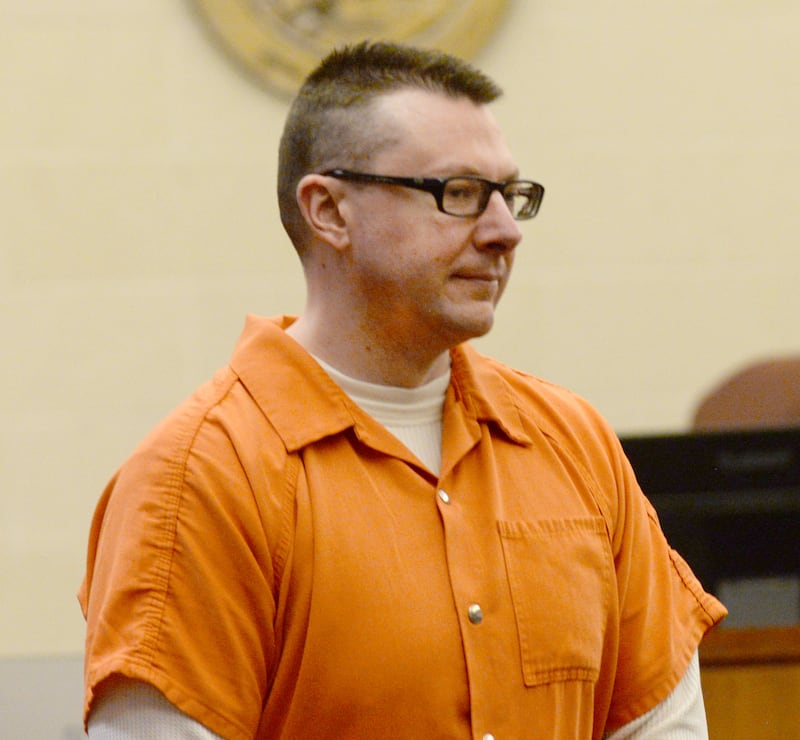OREGON — It will be at least another eight months before an Ogle County jury decides the fate of a Stillman Valley man charged with killing his ex-wife in 2016 and setting her Byron home on fire, also resulting in the death of their 3-year-old son.
Duane Meyer, 43, is charged with four counts of first-degree murder, two counts of aggravated arson and one count of concealment of a homicidal death in connection with an Oct. 19, 2016, Byron house fire in which his ex-wife, Margaret “Maggie” (Rosko) Meyer, 31, was found dead.
The couple’s 3-year-old son, Amos Meyer, who also was home at the time of the fire, was later pronounced dead at a Rockford hospital.
Meyer has pleaded not guilty to all of the charges and has been held in the Ogle County Jail since his arrest Oct. 9, 2019.
On Wednesday, May 14, Meyer’s attorney, Christopher DeRango of Rockford, said his schedule was filled with “complex murder trials” in each summer month.
“I have one substantial murder trial every month until November,” DeRango told Ogle County Judge John “Ben” Roe, adding it would “not be realistic” to try and hold the Meyer trial this year.
DeRango filed a motion in January to move the trial out of Ogle County, just three weeks before the jury trial was scheduled to start Feb. 3 and expected to take the entire month.
At that time, DeRango argued that because of “heavy” media coverage of Meyer’s numerous pretrial hearings since 2016, Meyer could not “obtain a fair trial in Ogle County, Illinois.” He also has claimed that derogatory comments on social media pages about his client were prejudicial.
But Ogle County State’s Attorney Michael Rock and his assistants argued against the change of venue, arguing that Meyer would “absolutely receive a fair trial” in Ogle County.
Assistant State’s Attorney Allison Huntley said pretrial publicity was primarily updates about the case as it moved through the court system.
And, she argued, potential jurors could be eliminated during voir dire. She said there was no evidence that the pretrial publicity in the Meyer case was so pervasive and prejudiced that juror responses to voir dire questions concerning potential bias would be unreliable.
Roe ruled April 23 against moving the trial to another county after “considering all evidence, motions” and attorney arguments.
After that ruling, Roe asked Assistant State’s Attorney Matthew Leisten and DeRango to start considering dates for a new trial.
Leisten also told Roe that the FBI expert who had analyzed cellphone data for the prosecution had retired and been replaced by a new agent. He said that the FBI’s presentation of data collected in connection with the case – which includes text messages and locations of Meyers’ phone based on transmission towers – had also been updated due to technological upgrades.
Leisten gave the new FBI agent’s report to DeRango last month.
At Wednesday’s status hearing, DeRango said he had received the report and it was “quite different” due to the technology changes.
In previous hearings, DeRango and prosecutors have said numerous cellphone records and data will be part of the evidence presented.
“I have consulted with our experts and we would like to get this on the jury call for next year,” DeRango said. “I have very complex murder trials every month this year.”
Leisten said seating a jury in November or December would be difficult due to the expected length of Meyer’s trial.
“November is almost near impossible for cases like this,” said Leisten. “December is even worse.”
Leisten said he had reached out to the many state witnesses expected to testify to let them know January 2026 was being targeted as the month for the trial.
Roe set the new trial date for Jan. 5, 2026. He remanded Meyer to the Ogle County Jail and set the next hearing for 1:30 p.m. June 27.
At that hearing, attorneys are expected to argue motions in limine, one of which will determine if graphic autopsy photos should be presented to the jury.
The purpose of a motion in limine (Latin for “on the threshold”) is to determine whether certain evidence may be presented to the jury. They are commonly entered and argued before a trial begins in order for the judge to determine whether certain items or statements can be allowed as evidence and presented to jurors.
Maggie (Rosko) Meyer was a teacher at the Chana Education Center at the time of her death. She filed for divorce in 2014, and court records show the divorce was finalized in September 2016.
Prosecutors have argued that their evidence will show Duane Meyer planned to end Maggie’s life.
The defense has argued that text messages sent by Duane Meyer before the deaths were only part of a “contentious” divorce and not indicative of anything nefarious. Prosecutors disagree.
Wednesday’s continuance is one of many requested and granted as the case continues through the court system.

:quality(70)/author-service-images-prod-us-east-1.publishing.aws.arc.pub/shawmedia/c70d24f0-1332-4244-8446-e91288029474.jpg)